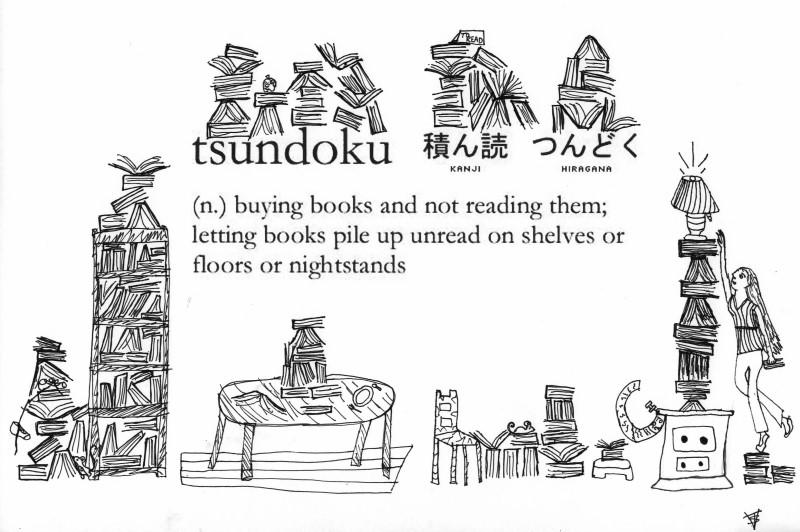

There are certain words in different languages that are brilliantly evocative and yet challenging to fully translate. Yiddish has the word shlimazl, which basically means a perpetually unlucky person. German has the word Backpfeifengesicht, which roughly means a face that is badly in need of a fist. And then there’s the Japanese word tsundoku, which perfectly describes the state of my apartment – buying books and letting them pile up unread.
The term tsundoku dates back to the Meiji era (1868–1912) in Japan and originates from a pun. Literally meaning reading pile, tsundoku is written in Japanese as 積ん読. So, while tsunde oku means to let something pile up and is written 積んでおく, a witty alteration by swapping oku (おく) in tsunde oku for doku (読) – meaning to read – led to the birth of the term tsundoku.
With other Japanese words like karaoke, tsunami, and otaku entering the English language, it’s about time for tsundoku to join the ranks. Perhaps we need a term for unread ebooks languishing on Kindle too. E-Tsundoku? Tsunkindle? Ponder over it for a while.
The charming illustration above was created when a Redditor asked his daughter to illustrate the word “Tsundoku,” and she delivered brilliantly.
Note: A previous version of this post was featured on our site back in July 2014.
If you wish to subscribe to Open Culture’s free email newsletter, you can find it here. Alternatively, stay updated with our posts on Threads, Facebook, BlueSky, or Mastodon.
If you’d like to support Open Culture’s mission, consider making a donation to our site. It’s challenging to rely solely on ads, and your contributions will assist us in continuing to provide top-notch free cultural and educational materials to learners worldwide. You can contribute through PayPal, Patreon, and Venmo (@openculture). Thank you!
Related Content:
The Virtue of Owning Books You Haven’t Read: Why Umberto Eco Kept an “Antilibrary”
An Archive of Vividly Illustrated Japanese Schoolbooks, from the 1800s to World War II
The Japanese Fairy Tale Series: The Illustrated Books That Introduced Western Readers to Japanese Tales (1885–1922)
A Wonderfully Illustrated 1925 Japanese Edition of Aesop’s Fables by Legendary Children’s Book Illustrator Takeo Takei
1,000+ Historic Japanese Illustrated Books Digitized & Put Online by the Smithsonian: From the Edo & Meji Eras (1600–1912)
Jonathan Crow is a Los Angeles-based writer and filmmaker whose work has appeared in Yahoo!, The Hollywood Reporter, and other publications. Follow him at @jonccrow and check out his art blog Veeptopus.



